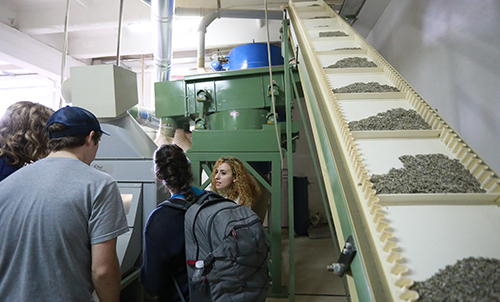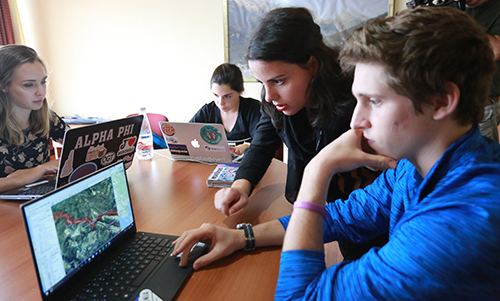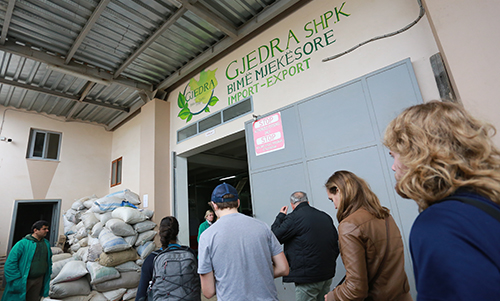Plants Project

WPI Albania Project Center: Sowing the Seeds for Sustainable Harvesting of Albania’s Plants
Student project seeks to preserve thriving medicinal and aromatic plant trade

Visiting a medicinal and aromatic plant collector facility in the Berat region
The next time you’re preparing a dish requiring the sweet yet peppery taste of sage, consider this: there’s a good chance that the savory spice in front of you originated on a mountainside in Albania. The small country on the southwestern edge of the Balkan Peninsula is currently the world’s largest exporter of sage, supplying 70 percent of the sage market in the United States. It is an increasingly major player in the international trade in many other medicinal and aromatic plants, including lavender, thyme, oregano, and juniper.
While the medicinal and aromatic plants industry is a significant source of income for many people in rural Albania, it may soon become a victim of its own success, as increasing demand is leading to unsustainable harvesting practices. The very feature that makes these herbs and plants from Albania so attractive—the fact that they grow wild in areas untouched by human development—is being threatened by impending plans to construct hydropower dams along Albania’s Vjosa River.
A team of WPI undergraduates recently spent seven weeks investigating ways of improving harvesting as part of their Interactive Qualifying Project (IQP)—a project that requires teams to delve into a problem that matters to real people—undertaken at WPI’s Albania Project Center.
The students, biomedical engineering major Daniel Amirault, chemical engineering Michael Collins, biology & biotechnology major Sara Larson, and mechanical engineering major Basak Soylu, were sponsored by EcoAlbania, a local non-governmental environmental organization.
Olsi Nika, executive director of EcoAlbania, says he brought the students on board to help gather crucial information needed for EcoAlbania’s larger initiative to preserve the Vjosa River and stop the spread of hydropower dams that threaten the river’s rich ecosystem.
"There have been some sporadic studies regarding these medicinal and aromatic plants, but we needed to know more about their status and how much the local community benefits from them," says Nika. "It's very difficult for us to get into the field and gather the data, so we thought this was a big opportunity to fill in a missing piece of a bigger puzzle."
- Olsi Nika, Project Sponsor

Team meeting with the sponsor at their office
As with all IQPs, the students began their project by conducting extensive research, in this case identifying species of medicinal and aromatic plants in the Vjosa watershed. They then created an inventory of 400 species, 47 of which are considered to be endangered or vulnerable according to the IUCN Red List of Threatened Species.
To gain more insight into the industry, the students interviewed various stakeholders, including local harvesters who gather the plants, regional collectors who store them, and large production companies that process the plants and bring them to market.
"The interview we did with one plant collector was really important, as we were able to unlock more information about the plants they export. For example, they had a huge mountain of lavender that was going to Austria later that weekend," says Amirault.

Taking a tour of the medicinal and aromatic plant collector facility
The students also made the important discovery that there is a significant lack of oversight within the industry, which enables participants to focus on quantity over quality. In their final report, the students describe how harvesters often use damaging harvesting practices, gather plants listed as endangered, and even grow their own plants in less than ideal conditions, while collectors often comingle products from many harvesters. The end result is that producers are unable to verify their product sources and certify them as organic, leading to lower selling prices.
While the students found such inefficiencies to be widespread, Larson notes that some stakeholders are making efforts to tackle them.

Meeting members of Gjedra, a medicinal and aromatic plant collector
“From the visit at the processing facility," she says, "it was interesting to learn that they have implemented some measures to preserve the sustainability of their practices and teach the farmers to keep the industry running and not completely destroy the wild plants in the region, which I did not expect at all,” says Larson.
In order to build on these initiatives, the students produced a set of recommendations aimed at incentivizing workers at all levels to create high-quality, organic products that can command a higher price while reducing destructive harvesting practices.
The team shared these recommendations in their final report as well as a fact sheet and video clips that EcoAlbania plans to distribute to local stakeholders.
- Olsi Nika, Project Sponsor
“In our experience, people in the local community need something printed, but they don’t want to read too much,” says Nika. "The factsheet could be very valuable and widely used because it contains all the information in a very concentrated way."
Besjana Guri, EcoAlbania’s communication officer, says that the organization also hopes to have a larger impact by distributing findings from the students’ report through their website and social media as well as to members of the larger scientific community in Albania.
“We could use this study in order to promote change for other sites of Albania. This data will be very useful for other students, for other universities, and for other local people who are working with medicinal plants,” says Guri. “The study also helps us have more arguments on our campaign to save the Vjosa, the last wild river in Europe. As much information, as much data, as many arguments as we have, the better is our position and the bigger is our opportunity to save this river.”